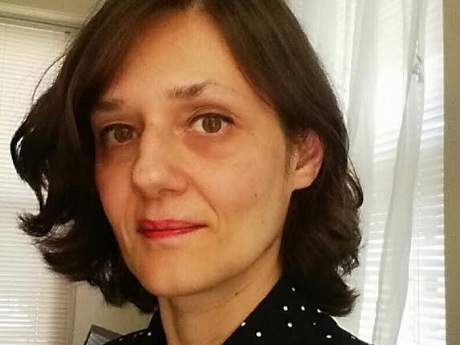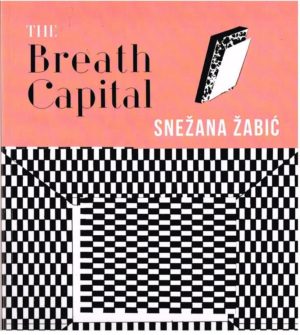In Their Own Words
Snežana Žabić on “Span”

Span
We complete our purchases and note the air-conditioned flow of particles through our breathing apparatuses.
Cashiers and security guards, visible labor.
Maintenance staff, light sources and shadows at once.
When the eldest one of us was born, future was a carnival and parrots rode motorcycles. A lifespan can be impossibly long.
Slight breeze, humidity, clouds like crumpled aluminum foil.
Elsewhere, a marathon runner raised awareness today by letting her blood flow stain her crotch. It's here, she said, linearity and brokenness.
The aluminum foil is smoothened and burnt.
Heal like a fractured bone, child.
From The Breath Capital (New Meridian, 2016). All rights reserved. Reprinted with the permission of the author.
On "Span"
In each generation, poets try to explain anew what poetry does, using metaphors that reflect the technology of their age. In our internet era, Harryette Mullen writes: "If encyclopedia collects general knowledge, the recyclopedia salvages and finds imaginative uses for knowledge. That's what poetry does when it remakes and renews words, images, and ideas, transforming surplus cultural information into something unexpected." Most people live in dread of downward mobility, but access to knowledge, or at least information, seems wide open. Yet there's a sense of inefficiency at handling our crises because while we can access information, we can't seem to access power needed to enact change. The only area of power that's open to us is to experiment in art, and especially in the shadows of poetry.
In the era of mechanical reproduction, William Carlos Williams came up with: "A poem is a small (or large) machine made out of words. (...) Prose may carry a load of ill-defined matter like a ship. But poetry is a machine which drives it, pruned to a perfect economy." By contrast, at the very beginning of the industrial revolution, when machines were a bit slower and labor a bit less alienated, William Wordsworth wrote about the overflow of powerful feelings: "The emotion is contemplated till, by a species of reaction, the tranquility gradually disappears, and an emotion, kindred to that which was before the subject of contemplation, is gradually produced, and does itself actually exist in the mind."
My poetry is a language recycling facility that works with sampling, translation, interpretation and misinterpretation. The operation is collectively owned, and I'm an assembly line worker. In The Breath Capital, I translate and then recycle manifestos and poetry by Czech avant-garde poets whose activity exploded between two word wars and included the 1924 poem by Vítĕzslav Nezval titled "Parrot on a Motorcycle." In the book, I also sample talks and writings of feminist scholars from the past two decades. I also read questionable news sources and watch TV, and that enters the poems as well.
When I was organizing The Breath Capital, I imagined a shadowy presence of someone who was born several years before 1924 and who was still alive when I was writing down lines that would appear in the final version of "Span," the prose poem that closes the collection. It was the summer of 2015, and I was scribbling while people watching by the entrance of a Midwestern shopping mall: shoppers and workers, folks of all ages and abilities in and out of big boxes surrounded by parking lots and delivery areas where more labor was taking place, invisible to us, and from where the trash was being hauled away. From the raw materials dug out of or planted and harvested in Africa and South America, to the factories in Eastern Europe and Asia, to the bland American shopping experience, and then on to landfills, recycling facilities, and garbage patches in oceans, our connection runs deep and scares us.
Just before my shopping mall people watching and scribbling session, I was reading a news story about Kiran Gandhi, a British drummer who also runs marathons, who didn't break any records running that year, but she was simply on her period and didn't opt for a tampon. After almost five hours of running, it's not like there was some spontaneous overflow of powerful red fluid: there was a small amount of blood on her rose-colored running capris when she posed for pictures with other medal-wearing runners. Although bleeding through my clothes is the least of my worries, I appreciate Kiran, and so "Span" references her rebellious yet most of all practical act in the poem.
Information that enters my consciousness gets pulped, melted down, and pulverized until it's unrecognizable and then gets reconstituted as new poems for someone else to maybe recycle down the line.



